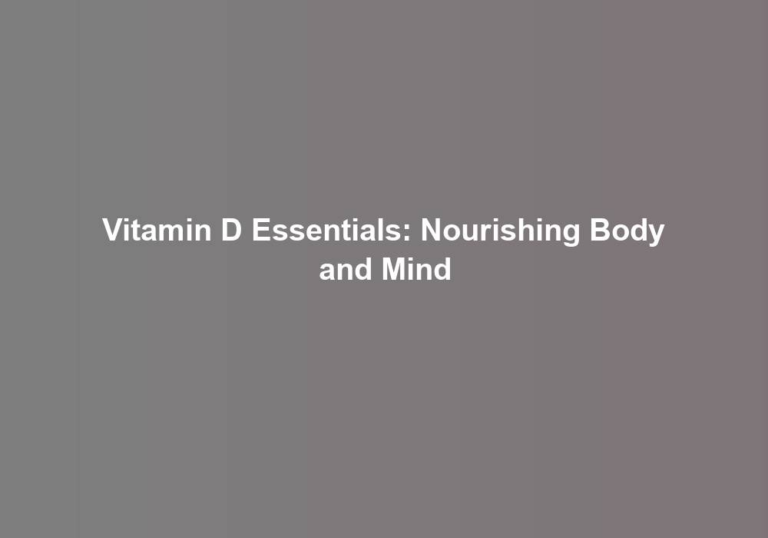Unlocking the Power of Vitamin D
Feeling like you could use a little more energy and vitality in your life? Well, look no further than the power of vitamin D. You may not realize just how crucial this nutrient is for your overall health and well-being. From supporting strong bones and a robust immune system to even impacting your mental health, vitamin D plays a vital role in numerous bodily functions. But are you getting enough of it? LetG??s explore how unlocking the potential of vitamin D could be the key to optimizing your health in ways you may not have considered.
The Importance of Vitamin D
Understanding the vital role of vitamin D in maintaining overall health and well-being is essential for individuals of all ages. Vitamin D is crucial for a wide range of health benefits, including bone health, immune function, and mood regulation. One of the key roles of vitamin D is its contribution to the absorption of calcium and phosphorus, essential minerals for maintaining strong and healthy bones. Without adequate vitamin D, the body is unable to effectively utilize these minerals, leading to an increased risk of bone disorders such as osteoporosis. Additionally, vitamin D plays a significant role in supporting the immune system, helping the body to defend against infections and diseases. Research has also shown a link between vitamin D levels and mental health, with low levels being associated with an increased risk of depression and mood disorders.
When it comes to supplement options, there are several choices available to ensure adequate vitamin D intake. Vitamin D3, also known as cholecalciferol, is the most effective form for supplementation. It is important to consider the dosage and source of the supplement, as well as any potential interactions with other medications. Additionally, natural sources of vitamin D include sunlight exposure and certain foods such as fatty fish, egg yolks, and fortified dairy products. However, it can be challenging to obtain sufficient vitamin D from these sources alone, especially for individuals with limited sun exposure or specific dietary restrictions.
Sources of Vitamin D
You can obtain vitamin D from sunlight exposure as well as from certain dietary sources. Sunlight triggers the production of vitamin D in your skin, making it a primary source of this essential nutrient. Additionally, foods such as fatty fish, egg yolks, and fortified dairy products are also rich in vitamin D.
Sunlight as Source
The human body synthesizes vitamin D when exposed to sunlight, making it a crucial natural source of this essential nutrient. Sun exposure triggers a series of chemical reactions in the skin, leading to the production of vitamin D. This process is vital for maintaining healthy levels of this nutrient in the body. However, itG??s important to balance sunlight benefits with skin protection. While sunlight is a primary source of vitamin D, excessive exposure can lead to skin damage and increase the risk of skin cancer. Therefore, itG??s essential to find a balance between obtaining adequate sunlight for vitamin synthesis and protecting your skin from harmful UV rays. Understanding the benefits of sunlight and taking appropriate measures for skin protection is key to unlocking the power of vitamin D.
Dietary Sources
After considering the role of sunlight as the primary source of vitamin D, itG??s crucial to explore the dietary sources that contribute to the bodyG??s intake of this essential nutrient. While itG??s challenging to obtain sufficient vitamin D from food alone, certain dietary sources can still make a meaningful contribution. Below is a table outlining some key dietary sources of vitamin D, along with their approximate vitamin D content and absorption rates.
| Dietary Sources | Vitamin D Content (IU) | Absorption Rate |
|---|---|---|
| Fatty Fish (e.g., salmon, mackerel) | 450-1000 IU per 3.5 ounces | 50-60% |
| Fortified Foods (e.g., milk, orange juice) | 100 IU per serving | 70-80% |
| Supplements | Varies | Varies |
Vitamin D and Bone Health
Vitamin D plays a crucial role in maintaining the strength and density of your bones. It facilitates the absorption of calcium in your intestines, which is essential for bone mineralization. Here are three ways in which Vitamin D influences your bone health:
-
Bone Density: Vitamin D has a direct impact on bone density. It aids in the regulation of calcium and phosphate levels in the body, both of which are crucial for maintaining bone mineral density. Without adequate Vitamin D, your body may struggle to absorb calcium efficiently, leading to decreased bone density and an increased risk of fractures.
-
Calcium Absorption: Vitamin D enhances the absorption of calcium from the food you consume. When your body lacks Vitamin D, it absorbs less calcium from the diet, which can lead to weakened bones and an increased risk of fractures. By ensuring sufficient Vitamin D levels, you can optimize the absorption of dietary calcium and support the maintenance of strong and healthy bones.
-
Bone Remodeling: Vitamin D also plays a role in bone remodeling, the continuous process of bone resorption and formation. This process is crucial for maintaining bone strength and structure throughout your life. Adequate Vitamin D levels support optimal bone remodeling, reducing the risk of bone fractures and osteoporosis.
Ensuring that you have adequate Vitamin D levels is essential for maintaining healthy bones and reducing the risk of bone-related disorders. Regular exposure to sunlight, consumption of Vitamin D-rich foods, and supplementation, if necessary, are all important strategies for supporting your bone health.
Vitamin D and Immune Function
Boost your understanding of the role of Vitamin D in immune function with the following evidence-based information.
Vitamin D plays a crucial role in modulating the immune system, and its deficiency has been linked to increased susceptibility to infections and autoimmune diseases. Research suggests that Vitamin D has anti-inflammatory effects, which can help regulate the immune response and reduce the risk of chronic inflammation. Additionally, Vitamin D has been associated with improved respiratory health, making it an essential nutrient for maintaining a strong immune system, especially in the context of respiratory infections.
| Vitamin D and Inflammation | Vitamin D and Respiratory Health |
|---|---|
| Helps regulate the immune response by reducing chronic inflammation | Plays a role in improving respiratory health and reducing the risk of respiratory infections |
| Supports the immune system in maintaining a balanced inflammatory response | Deficiency has been linked to an increased susceptibility to respiratory infections |
| May help reduce the risk of autoimmune diseases by modulating the immune system | Adequate levels are crucial for optimal lung function and defense against respiratory pathogens |
| Research suggests that Vitamin D has anti-inflammatory effects | Vitamin D supplementation has been shown to reduce the risk and severity of respiratory infections |
Vitamin D and Mental Well-being
The crucial role that Vitamin D plays in modulating the immune system prompts further exploration of its potential impact on mental well-being. Evidence suggests that Vitamin D is not only essential for physical health but also for mental well-being. Here are some key points to consider:
-
Vitamin D and mood regulation
-
Vitamin D receptors are found in areas of the brain associated with mood regulation. Research indicates that adequate levels of Vitamin D may be linked to the production of neurotransmitters such as serotonin, which plays a crucial role in regulating mood and warding off depression.
-
Studies have shown that individuals with higher levels of Vitamin D tend to have a more positive outlook and are less likely to experience mood disorders.
-
Vitamin D deficiency and depression
-
Low levels of Vitamin D have been associated with an increased risk of developing depression. Research has shown that individuals with depression often have insufficient levels of Vitamin D.
-
Addressing Vitamin D deficiency through supplementation or increased sun exposure has been linked to improvements in depressive symptoms.
Understanding the relationship between Vitamin D and mental well-being is crucial for maintaining overall health. Incorporating Vitamin D into your daily routine through safe sun exposure and dietary sources can potentially contribute to a positive mood and mental outlook. If you suspect a deficiency, itG??s essential to consult with a healthcare professional to determine the most appropriate course of action.
Optimizing Vitamin D Levels
Ensuring optimal levels of vitamin D in your body is essential for maintaining overall health and well-being. Vitamin D plays a crucial role in various bodily functions, including bone health, immune function, and reducing inflammation. Research has also suggested its potential role in reducing the risk of chronic diseases. To optimize your vitamin D levels, it is important to consider both sun exposure and dietary sources. Moreover, vitamin D supplementation may be necessary, especially for individuals with limited sun exposure or those at higher risk of deficiency.
| Vitamin D Food Sources | Vitamin D Supplementation Benefits |
|---|---|
| Fatty fish (salmon, mackerel) | Helps maintain adequate levels, especially during winter months or in regions with limited sunlight |
| Fortified foods (milk, cereals) | Reduces the risk of deficiency, which is associated with various health issues |
| Egg yolks | Supports bone health and mineralization |
| Cheese | May aid in the prevention of chronic diseases such as cardiovascular disease, cancer, and autoimmune conditions |
| Beef liver | Supports immune function and helps reduce inflammation |
Research has indicated that maintaining sufficient vitamin D levels is associated with a reduced risk of chronic diseases such as cardiovascular disease, certain cancers, and autoimmune conditions. Additionally, vitamin D supplementation has been shown to improve bone health, reduce the risk of fractures, and support overall immune function. It is important to consult with a healthcare professional to determine the appropriate supplementation for your individual needs.
Conclusion
In conclusion, maintaining optimal levels of Vitamin D is crucial for overall health and well-being. Did you know that up to 42% of the U.S. population is Vitamin D deficient? By incorporating Vitamin D-rich foods like fatty fish, fortified dairy products, and spending time in the sun, you can unlock the power of Vitamin D and support bone health, immune function, and mental well-being. DonG??t underestimate the impact of Vitamin D on your health.







